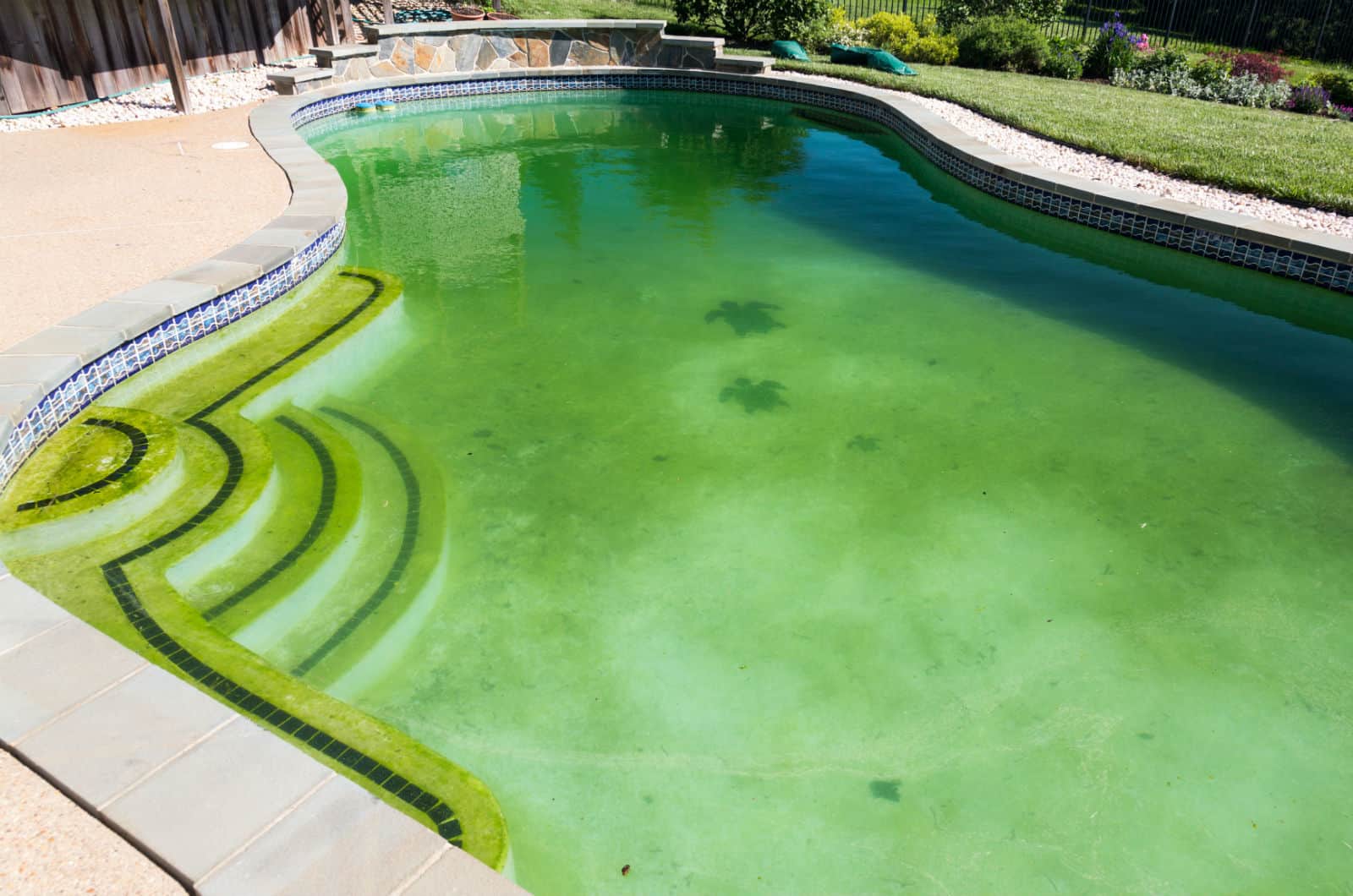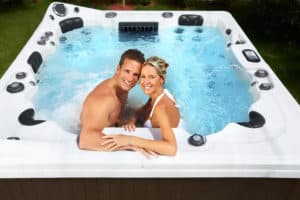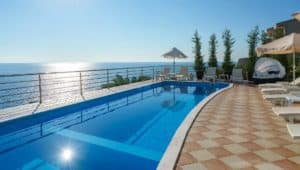Yellow pool algae can be very stubborn and hard to keep out. Here are 5 items that we constantly battle to prevent yellow pool algae
- Warm water, pool covers, and/or high use
- High pH and alkalinity
- Dirty pool filter/bad parts inside
- High pool conditioner
- High phosphates
1. Yellow Pool Algae Loves Warm Water, Pool Covers, and/or High Use
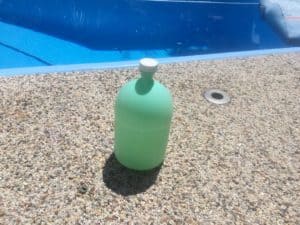 In our experience, the easiest way to invite yellow pool algae is to not add enough chlorine. We need enough chlorine in the pool water to sanitize and kill bacteria and other living products. Bubble covers add shade and heat and yellow pool algae loves that environment with zero to no chlorine. Read our article on non-chlorine shock for more details how bodies in the water lead to pool water issues and even smelly pool water.
In our experience, the easiest way to invite yellow pool algae is to not add enough chlorine. We need enough chlorine in the pool water to sanitize and kill bacteria and other living products. Bubble covers add shade and heat and yellow pool algae loves that environment with zero to no chlorine. Read our article on non-chlorine shock for more details how bodies in the water lead to pool water issues and even smelly pool water.
We make sure to add enough chlorine to measure 2 ppm to 4 ppm of available chlorine every pool service visit. Of course, this is more difficult with high use and warm water which is why tablet chlorine may be necessary in the warmer months. If yellow pool algae is already present, it takes very high levels of chlorine to kill it and we use a special algae preventative that only pool service professionals can buy in addition to chlorine.
High ideal levels of chlorine should always be maintained and we need to adjust how much to add in the warmer months as demand for chlorine will grow.
2. High pH And Alkalinity
Chlorine is more effective at lower pH and alkalinity levels. We don’t want our pH and alkalinity too low, but we want them on the lower ideal side. We always need to know our trend of the pH and alkalinity, so we can safely aim for low ideal. We also need to know what our carbonate alkalinity is, so we are not making our pool water aggressive by adjusting our total alkalinity too low. You can read our article “Pool Conditioner Is Important” to learn how we find our carbonate alkalinity.
3. High Pool Conditioner
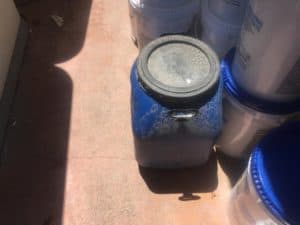 Pool conditioner is very important and we need 50 ppm to 80 ppm of it all the time, but too much is bad. Chlorine tabs are very convenient as they dissolve slowly and feed a constant, moderate amount of chlorine to the swimming pool or spa while liquid chlorine is usually poured at one time and has more dramatic spikes. Pool conditioner will increase in your pool water over time if you use chlorine tabs which is why we switch to liquid chlorine as soon as we can after summer.
Pool conditioner is very important and we need 50 ppm to 80 ppm of it all the time, but too much is bad. Chlorine tabs are very convenient as they dissolve slowly and feed a constant, moderate amount of chlorine to the swimming pool or spa while liquid chlorine is usually poured at one time and has more dramatic spikes. Pool conditioner will increase in your pool water over time if you use chlorine tabs which is why we switch to liquid chlorine as soon as we can after summer.
High pool conditioner will make the chlorine in your pool water less efficient in addition to other issues. High pool conditioner will increase the alkalinity of pool water and force us to keep our total alkalinity high to avoid low carbonate alkalinity and aggressive pool water. High conditioner makes it harder to fight or prevent yellow pool algae, so best to aim for 50 to 80 ppm. Every 5 to 10 years, we need to use pool water recycling or drain and refill our swimming pools for best pool water chemistry.
4. Dirty Pool Filter Or Pool Filter Issue
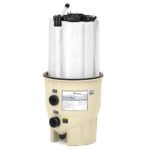 Dirty pool filters will slow down pool water flow and filtration. We always aim to keep our pool filter pressure ideal for best circulation. Pool filter Issues including the backwash valve will prevent sound filtration which means debris and micro-0rganisms like algae spores will return to the pool and find a home on the pool surface to bloom. We always look out for debris and diatamaceous earth returning to the pool around return lines.
Dirty pool filters will slow down pool water flow and filtration. We always aim to keep our pool filter pressure ideal for best circulation. Pool filter Issues including the backwash valve will prevent sound filtration which means debris and micro-0rganisms like algae spores will return to the pool and find a home on the pool surface to bloom. We always look out for debris and diatamaceous earth returning to the pool around return lines.
5. High Phosphates
Phosphates are what yellow pool algae eat to survive. Pools with excessive debris and leaves will grow in phosphates. We want to remove this food for yellow pool algae.
Prevent Yellow Pool Algae
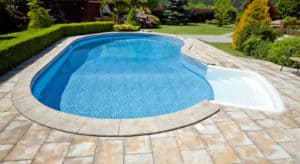 To prevent yellow pool algae, we aim for perfect pool water chemistry and add our special algae preventative nearly every visit. Our pool service technicians also must be aware of pool conditioner levels as well as carbonate alkalinity for complete expert pool care. Our expert pool service managers need to know which pools have high pool conditioner or total dissolved solids, so they can advise when to recycle pool water or customize a pool chemical plan to improve the pool water chemistry. Every 5 to 10 years, most swimming pools will have high total dissolved solids or pool conditioner which will force us to recommend pool water recycling or a drain and refill. A clean, sparkling swimming pool free of yellow pool algae is the centerpiece of your Pool Heaven. Now, get in that Pool Heaven and enjoy it!
To prevent yellow pool algae, we aim for perfect pool water chemistry and add our special algae preventative nearly every visit. Our pool service technicians also must be aware of pool conditioner levels as well as carbonate alkalinity for complete expert pool care. Our expert pool service managers need to know which pools have high pool conditioner or total dissolved solids, so they can advise when to recycle pool water or customize a pool chemical plan to improve the pool water chemistry. Every 5 to 10 years, most swimming pools will have high total dissolved solids or pool conditioner which will force us to recommend pool water recycling or a drain and refill. A clean, sparkling swimming pool free of yellow pool algae is the centerpiece of your Pool Heaven. Now, get in that Pool Heaven and enjoy it!
If you need help with any pool or spa projects in Orange County, Ca., provide us your information and we will respond with more info. and a free estimate or if we don’t provide the service, we will have the pool professional we use and trust contact you .
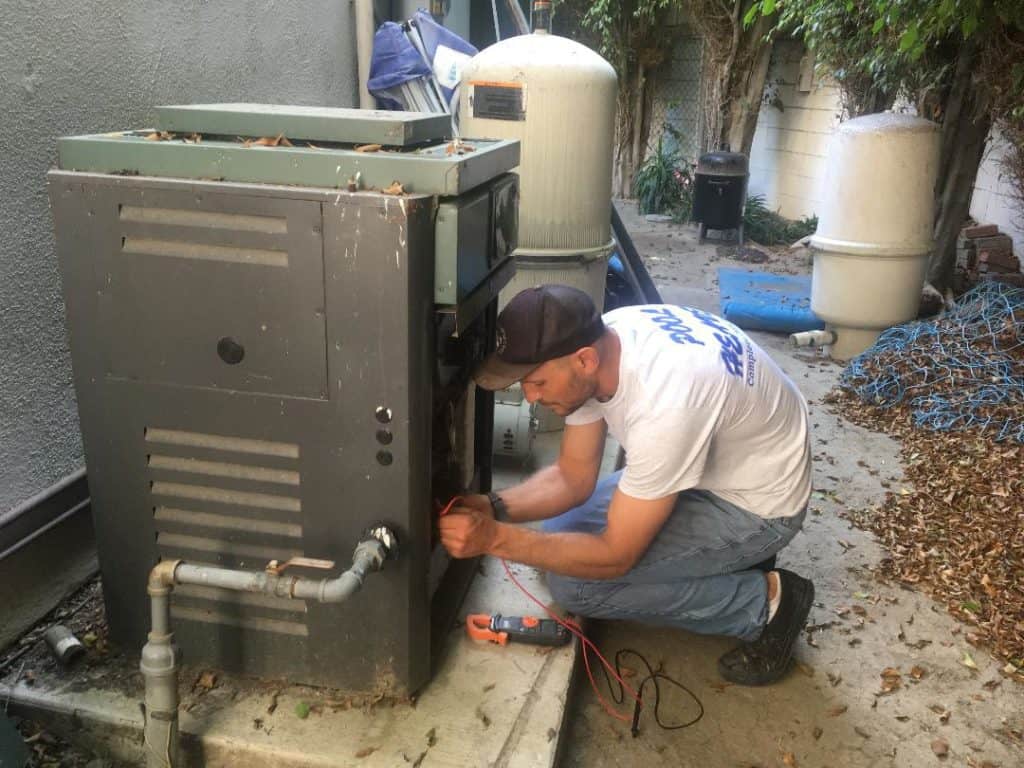
Check out one of these informative articles below or type in any swimming pool or spa related topic and click search.
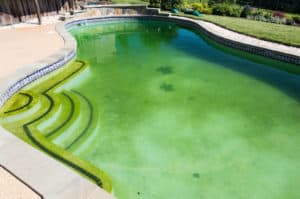
Best Pool Algae Treatment
One of the most common problems we face with new pool service customers is the pool algae problem. Pool algae also called yellow algae can
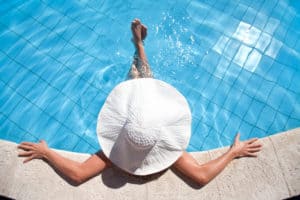
Everything About Owning A Salt Water Swimming Pool In Irvine, Ca.
Let’s put a couple of myths down to bed immediately! A salt water swimming pool generates chlorine and is a chlorine swimming pool. This generated
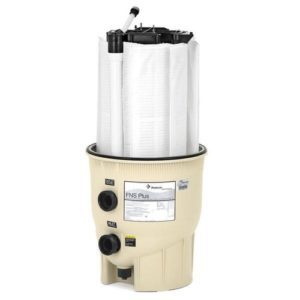
Swimming Pool Filter Issues Cause Dirty Water in Huntington Beach, CA.!!
Occasionally, we will get phone calls from our customers regarding their swimming pools being dirty after their service day. Sometimes they will say ” Our
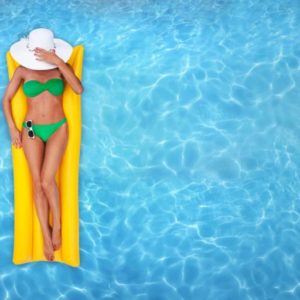
What is the role of Chlorine in pool water?
Water Chemistry Share Chlorine is a crucial element in maintaining properly balanced pool water. It is used as a disinfectant to kill harmful bacteria, viruses,

